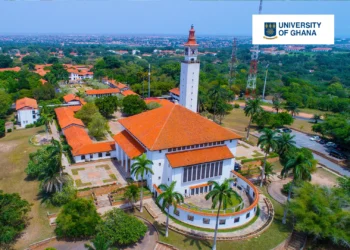Education Minister Hon. Haruna Iddrisu has reiterated the government’s firm belief that Technical and Vocational Education and Training (TVET) holds the most sustainable solution to youth unemployment in Ghana.
During a working tour in Koforidua to observe the commencement of the 2025 nationwide TVET examinations, the Minister emphasized the centrality of hands-on skills training in shaping employable graduates for an increasingly competitive job market.
“About the employability question? We have to invest more in technical and vocational education, invest more in hands-on training in order to equip our young people for the competitive world of work”
Hon. Haruna Iddrisu, Minister For Education
The Minister was accompanied on the inspection tour by Director General for TVET, Dr. Eric Kofi Adzroe, and Mr. Sulemana Zakaria of the Commission for TVET (CTVET). Speaking to journalists at one of the examination centres, he underscored the need to align national education priorities with real-world demands.

He noted that the government has intensified its focus on technical and vocational development as a deliberate policy intervention to bridge the skills gap in Ghana’s labour force.
Exam Integrity
Beyond monitoring infrastructure and logistics readiness, the Minister used the occasion to express concern about a rising trend in exam malpractice, one that needs immediate attention in the education sector.
“I am particularly concerned about a new growing phenomena of phone cheating during exams, which means that parents, students, and probably even supervisors may be looking on to this happening or it may be happening on their blind side”
Hon. Haruna Iddrisu, Minister For Education
He added that although this issue is not exclusive to TVET examinations, its emergence demands a collective response to safeguard the integrity of the country’s examinations across board.
“I heard this when the West African Exam Council held its award ceremony, and it means that it’s been brought to their attention,” he cautioned, adding that failure to swiftly nip the ill phenomenon in the bud puts the credibility of Ghana’s examination at further risk.

He warned against a situation where because of such malpractices, the international community casts a shadow of reasonable doubt over the country’s education system, convinced that examination results do not reflect the reality on the ground for even the best performing candidates or institutions.
The Minister encouraged all candidates to approach the TVET exams with determination and a strong sense of honesty, stressing that integrity must remain a non-negotiable value in Ghana’s education sector.
Inclusivity Challenges
The 2025 TVET examination has recorded approximately 55,000 participating candidates nationwide. Of this number, only about 14,000 are female candidates, with fewer than 50 candidates being persons with special needs.
These figures, the Minister said, reflect deeper issues of accessibility and gender inclusion within the TVET space. “It means that TVET is still not gender friendly in Ghana or female friendly.”
“We need to do more to wet the appetite of our young girls,” he urged, calling for targeted efforts to make TVET more appealing and accessible to girls and young women as an alternative route for education.

The Minister’s remarks come at a time when Ghana is navigating economic challenges that require strategic investments in human capital. The government’s continued investment in TVET reflects a belief that economic transformation will come through skills development and enterprise-led growth.
In tandem with his consistent push for the full exploitation of TVET by the youth, education policy under the Minister has increasingly focused on aligning curriculum with the job market, particularly in the trades, manufacturing, and digital sectors.
As Ghana prepares for a future shaped by automation, global competition, and shifting economic landscapes, TVET is being positioned as the bridge between formal education and sustainable employment.
With a renewed push toward gender inclusion, exam integrity, and practical training, policymakers believe TVET will evolve into a mainstream pillar of national development.























